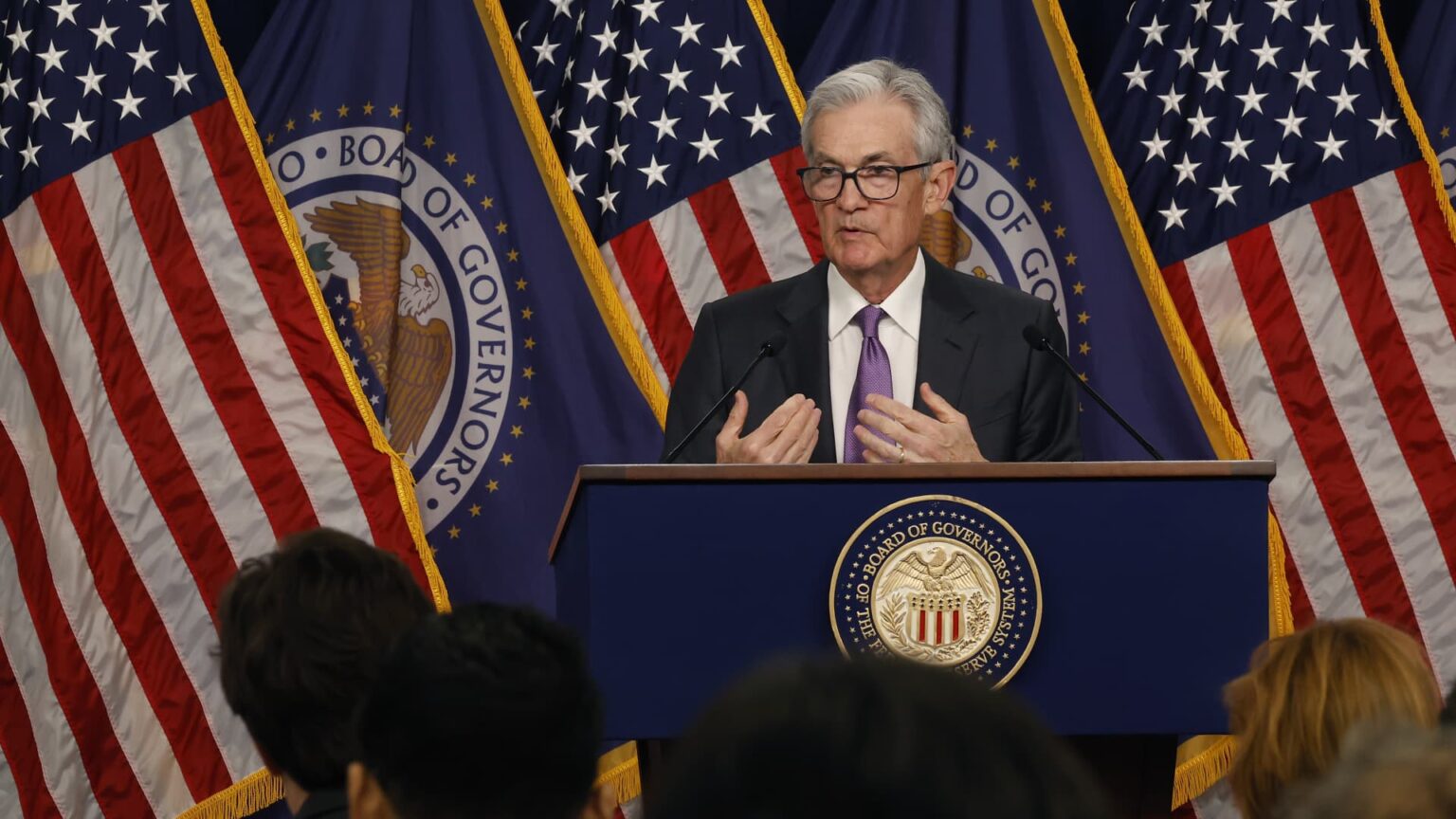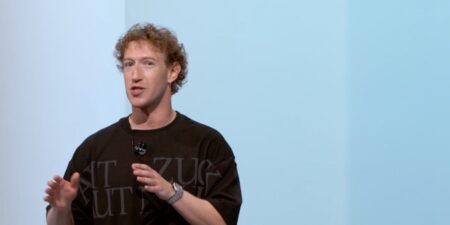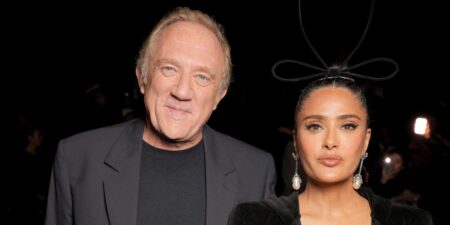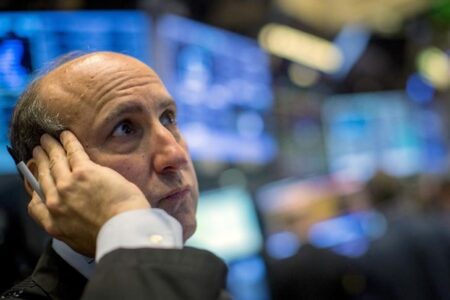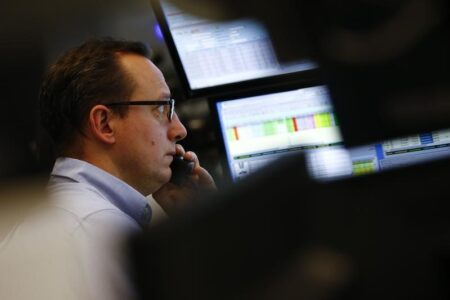Politics not a factor in rate decisions, Powell emphasizes
Federal Reserve Chair Jerome Powell said regardless of the upcoming U.S. presidential election this year, the central bank continues to make its interest rate decisions independently — and that any way otherwise could result in negative consequences.
“It’s hard enough to get the economics right here,” Powell said. “These are difficult things, and if we were to take on a whole other set of factors and use that as a new filter, it would reduce the likelihood we’d actually get the economics right.”
The pending election “just isn’t part of our thinking,” Powell added. “It’s not what we’re hired to do.”
— Hakyung Kim
Powell says he wants shrinking of balance sheet to be smooth
Federal Reserve Chair Jerome Powell stressed that the move to slow the pace of reducing its balance sheet is not being done to provide accommodation to the economy or be less restrictive.
“It really is to ensure that the process of shrinking the balance sheet down to where we want to get it is a smooth one and doesn’t wind up with financial market turmoil the way it did the last time we did this, and the only other time we’ve ever done this,” he said.
— Michelle Fox
Powell downplays ‘stagflation’ concerns
Last week’s GDP report that showed slowing overall growth but solid price increases raised some concern about the U.S. entering a period of “stagflation,” but Fed Chair Jerome Powell downplayed that idea on Wednesday.
“I don’t really understand where that’s coming from,” Powell said.
The central bank chief pointed out that, by some measures, economic growth is at 3% and inflation is below 3%.
“I don’t see the ‘stag’ or the ‘-flation’,” Powell added.
— Jesse Pound
Stocks rally as Powell says it’s unlikely the next move will be a rate hike
The major averages leapt sharply higher Wednesday afternoon after Federal Reserve Chair Jerome Powell said it is unlikely that the next policy rate move will be a hike.
The S&P 500 popped 0.8%, while the Nasdaq Composite jumped 1%. The Dow added more than 450 points, or 1.2%.
— Darla Mercado
Powell says it’s unlikely the next move is a rate hike
Federal Chair Jerome Powell ruled out the possibility that the next policy move at its June meeting will be an interest rate hike.
“I think it’s unlikely that the next policy rate move will be a hike. I’d say it’s unlikely,” Powell said.
Asked about what it would take to have a rate increase, Powell said, “I think we’d need to see persuasive evidence that our policy stance is not sufficiently restrictive to bring inflation sustainably down to 2% over time. That’s not what we think we’re seeing.”
— Yun Li
Fed is not gaining ‘greater confidence’ on inflation so far this year, Powell says
The Federal Reserve’s recent statements have indicated that central bankers want “greater confidence” that inflation is falling toward 2%. It is not quite clear what exactly that would entail, but the Fed is not there yet, according to Chair Jerome Powell.
“So far this year, the data have not given us that greater confidence,” Powell said.
The Fed chair then said the central bank was willing to sit tight until the inflation situation changes.
“It is likely that gaining such greater confidence will take longer than previously expected. We are prepared to maintain the current target federal funds rate for as long as appropriate,” Powell said.
— Jesse Pound
Fed is watching for labor market changes, Powell says
Fed Chair Jerome Powell said Wednesday that the central bank was keeping an eye on the job market, which has so far shown resiliency in the face of monetary policy tightening.
“We’re also prepared to respond to an unexpected weakening in the labor market,” Powell said. He noted the central bank’s “dual mandate,” which includes both stable prices and maximum employment.
— Alex Harring
JPMorgan’s David Kelly more confident rate cuts will begin this year
The Federal Reserve gave a slightly dovish message when it decided to cut the Treasury runoff from its balance sheet to $25 billion from $60 billion, said David Kelly, chief global strategist with JPMorgan Asset Management.
It could have just gone to $30 billion, he said on CNBC’s “Power Lunch.”
“The fact that they went that extra $5 billion, it probably doesn’t sound like a lot, but it does say that they are trying to send a message here that they are not going to be too hawkish,” he said. “It gives some more confidence they won’t hike again but they will eventually cut rates this year.”
— Michelle Fox
Fed’s ‘pro-economy’ decision should reassure investors, Global X’s Scott Helfstein says
Rather than a hawkish pivot, the Federal Reserve’s move to keep rates steady is a “pro-economy” statement that could push equities higher, according to Global X Senior Vice President and Investment Strategy Head Scott Helfstein.
“The Fed is more concerned that inflation fails to fall in an accelerating economy, and that should be reassuring for investors,” Helfstein said. “Companies are better able to plan, invest, and innovate when rates are stable. Markets like predictability and consistency.”
According to Helfstein, central bankers could be expecting a midcycle acceleration rather than an economic contraction, considering that commodity prices are rallying and industrial and tech sector earnings are beating expectations. “Corporate investment and consumer spending will probably drive the next leg of economic expansion, rather than lower rates,” he said.
— Pia Singh
Fed notes little progress toward 2% inflation goal shows cuts not on horizon, Bankrate analyst says
The Fed noting a lack of continued progress on batting down inflation early in its statement should tell traders not to hold their breath on interest rate cuts, according to Greg McBride, chief financial analyst at Bankrate.
The central bank said in the first paragraph of its statement that it has seen little further movement toward an annual inflation rate of 2%, which is the preferred level. For McBride, pointing to this so early in the release is telling.
“Calling that out in the first paragraph is tantamount to saying that interest rate cuts are not coming soon,” he said.
— Alex Harring
Powell says inflation is still too high
Fed Chair Jerome Powell sent a warning about sticky price pressures at the postmeeting press conference.
“Inflation is still too high. Further progress in bringing it down is not assured and the path forward is uncertain,” he said.
— Yun Li
Fed slows pace of balance sheet reductions
The Federal Reserve said Wednesday that it is going to slow the pace it is allowing maturing bond proceeds to roll off the balance sheet without reinvesting them.
The program, nicknamed “quantitative tightening,” began in June 2022 and has brought the balance sheet down to $7.4 trillion, $1.5 trillion less than its mid-2022 peak.
Starting in June, the Fed will reduce its monthly cap on Treasurys to $25 billion from $60 billion. As a result, the annual reduction in holdings will be $300 billion, compared to the $720 billion when the program began.
— Michelle Fox, Jeff Cox
Focus now on labor report, says Morgan Stanley’s Jim Caron
The market is anticipating the Federal Reserve’s first rate cut will come in December, yet many forecasters are thinking July, said Jim Caron, chief investment officer of the portfolio solutions group at Morgan Stanley Investment Management.
For Caron, the answer will come down to what happens with the labor market.
“The fly in the ointment is going to be the labor report. If the labor market starts to weaken, I think that advances the time scale for the Fed to start to cut earlier,” Caron said on CNBC’s “Power Lunch. “If the labor market stays strong, I think that they are going to stay on probably until December.”
— Michelle Fox
See what changed in the new Fed statement
The Fed released its latest statement Wednesday afternoon. Notably, the central bank pointed to a lack of progress in getting inflation back to the 2% goal.
Click here to see what changed compared with what was released at the previous meeting in March.
— Alex Harring
Federal Reserve leaves interest rates unchanged
Central bank policymakers held steady on interest rates at the conclusion of their meeting, a move that was widely expected by the markets.
The fed funds target rate remains at its 5.25% to 5.5% range.
The Federal Reserve called out a “lack of further progress” in getting inflation down to its 2% target.
Read more about the Fed’s latest decision from CNBC’s Jeff Cox.
— Darla Mercado
Markets before the Fed’s policy decision announcement
The S&P 500 and the Nasdaq Composite were each down about 0.2% as the Federal Reserve prepares for its rate decision. The Dow Jones Industrial Average was higher by roughly 130 points, or 0.3%.
The yield on the 2-year Treasury was lower by about 3 basis points at 5.012%, while the rate on the 10-year Treasury inched lower by nearly 4 basis points to 4.647%.
— Darla Mercado
Don’t expect too many details on the rate path from Powell, Russell Investments’ BeiChen Lin says
Federal Reserve Chair Jerome Powell likely will not provide too many particulars on when the first rate cut will come, according to BeiChen Lin, investment strategist at Russell Investments.
“I think Chair Powell may heed the ‘silence is golden’ maxim at this week’s press conference after its May Fed meeting,” he said in a written statement. “He’ll likely try to say as little as possible about when he expects the first rate cut to come in order to preserve optionality.”
The strategist noted that while market participants have been concerned about inflation being sticky, he noted that wage pressures “are likely to continue easing into 2024 as the labor markets further normalize.”
“Since wages are a key input cost for many services businesses, a cooling in wage growth can also help lower overall price pressures,” Lin said, noting that he thinks the likelihood of the Fed having to raise rates is “very, very low.”
“Even with the upside surprise to inflation in Q1, we still think the Fed will be in a position to cut interest rates this year, likely in September and December,” the strategist said.
— Darla Mercado
Vanguard sees a ‘deferred landing’ and a cautious Fed
The recent blast of hot inflation data is making the odds of a hoped-for “soft landing” less likely, according to Vanguard economists Joe Davis and Josh Hirt.
Most recently, the employment cost index, which tracks salaries and benefits, grew more than expected in the first quarter. That reading comes after the core personal consumption expenditures price index was hotter than economists anticipated for March.
“With inflation data continuing to be surprisingly hot for the past quarter, the narrative that these surprises are all attributable to ‘one offs’ in individual components is becoming harder to sustain,” Davis and Hirt said in a written statement. They noted that although the Fed’s policy is restrictive, it is not restrictive enough.
“Time will tell but the data suggest that what we call a ‘deferred landing’ is more likely than the long anticipated ‘soft landing,'” they added. “Along with our forecast for core inflation pressures to remain elevated as supply tailwinds fade, we expect this to keep the Fed cautious on cutting rates this year.”
— Darla Mercado
What to expect from the Federal Reserve on Wednesday
Central bank policymakers are expected to stay put on interest rates, keeping them at their target range of 5.25% to 5.5%. Indeed, fed funds futures trading indicates a 99% probability that rates will hold steady, per the CME FedWatch Tool.
The main event, however, will be the policy-setting Federal Open Market Committee’s statement at the conclusion of this meeting, as well as Fed Chair Jerome Powell’s 2:30 p.m. ET press conference. Traders will read into Powell’s comments to get a sense of where policymakers stand on the path for rates in 2024.
The Fed may also share details on its balance sheet, where it has been rolling off maturing Treasurys and mortgage-backed securities.
Read more from CNBC’s Jeff Cox here on what’s ahead for the Fed.
— Darla Mercado
Read the full article here







